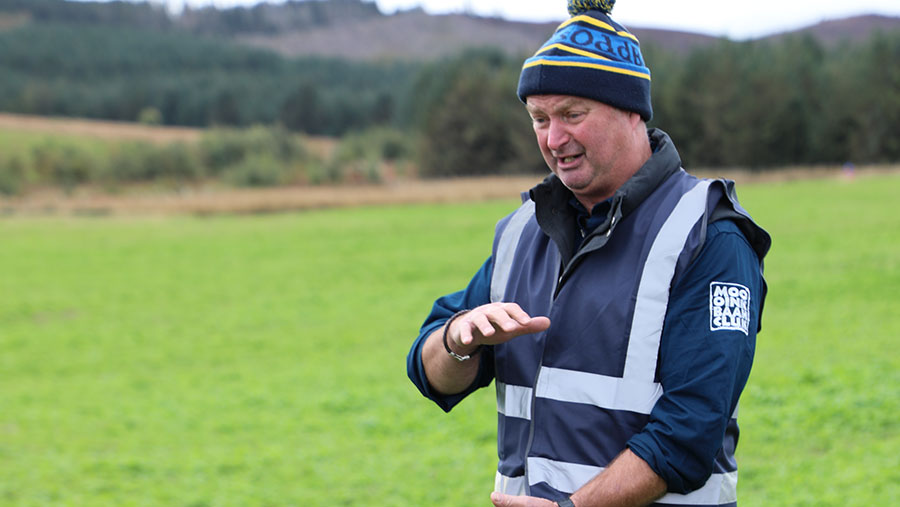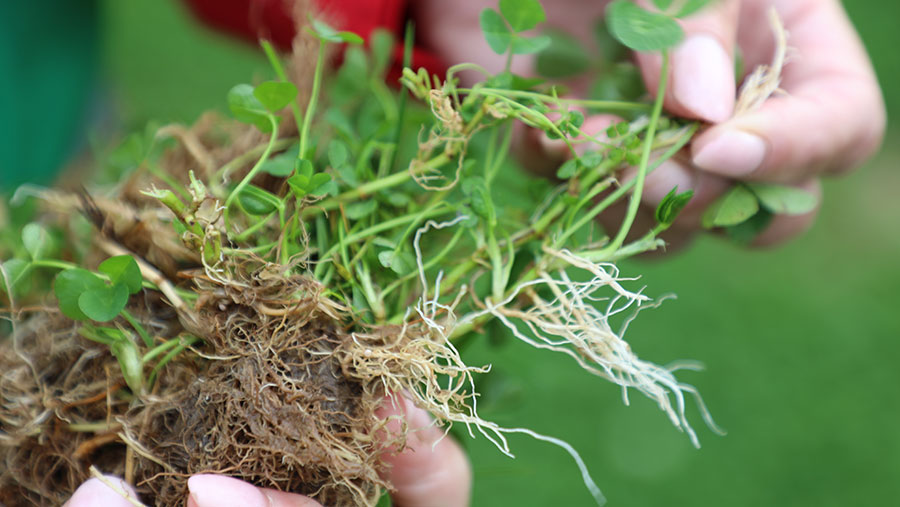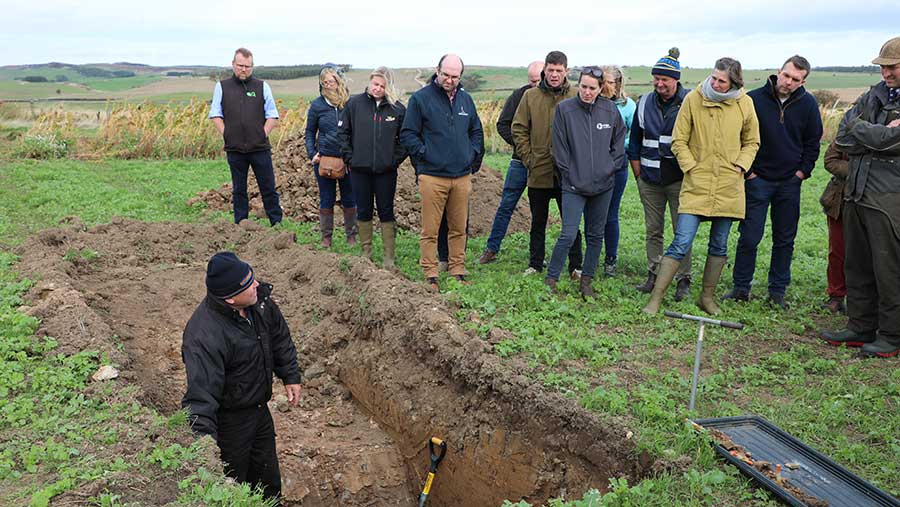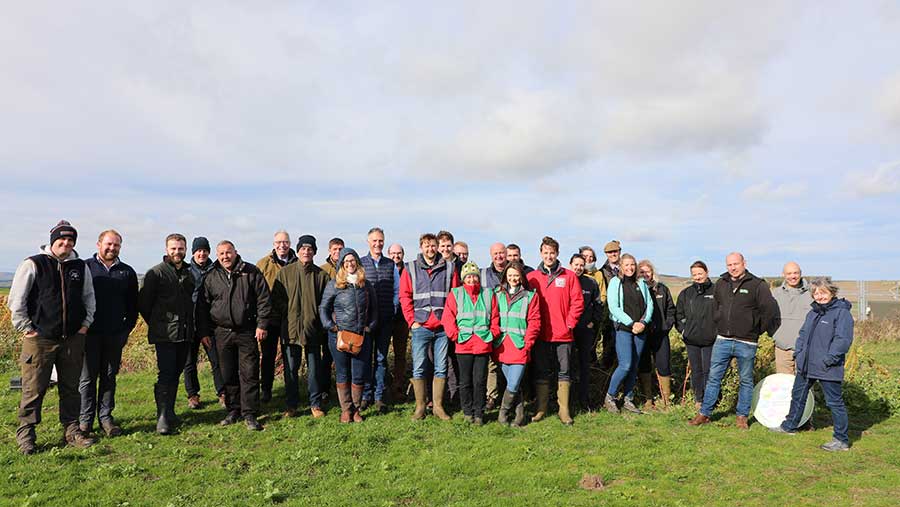Advertiser content
On-farm event explores sustainable livestock solutions
‘This isn’t just about clover – it’s about the future of livestock farming.’
That was the message from a recent on-farm event at North Bellshill Farm, part of Renner Farming in Northumberland, where farmers, advisors and researchers came together to explore how legumes can help build more efficient, resilient and climate-smart livestock systems.

© LEAF
Held as part of the NUE-Leg (Nitrogen Use Efficiency in Legumes) project, the day combined trial plot tours, soil pit sessions, and technical talks covering everything from forage innovation and livestock genetics to drone use in pasture management.
Organised by LEAF (Linking Environment And Farming) and hosted by the Renner family – longstanding LEAF Demonstration Farmers – it showcased how collaboration between science and practice can turn research into reality.
A Farm with a legacy of innovation
North Bellshill and nearby Amerside Hill make up a 202-hectare livestock enterprise near Berwick-upon-Tweed.
The Renner family have farmed in the area for over five centuries, combining deep local roots with a forward-thinking, environmentally responsible approach.
As LEAF Demonstration Farmers for over 20 years, they’ve hosted countless visitors keen to see Integrated Farm Management (IFM) in action – but this was their biggest event yet.
“For us, it’s always been about sharing ideas and learning together. This day was a chance to show what’s possible when research meets real farming.
Collaboration like this turns new ideas into practical solutions on the ground” said John Renner, who opened the day by sharing insight into their farm’s development and how IFM has guided their balance between productivity, environmental care, and long-term resilience.

John Renner © LEAF
Why nitrogen, why legumes?
The NUE-Leg project, funded by Defra and Innovate UK, is investigating how new forage legumes – including red clover, white clover hybrids, and birdsfoot trefoil – can help livestock farms reduce nitrogen fertiliser use, reduce emissions, and improve sward persistency and performance.
What is NUE-Leg?
A DEFRA and Innovate UK-funded project aiming to improve nitrogen use efficiency in forage legume-based livestock systems by:
- Trialling new legumes (RedRunner, DoubleRoot, birdsfoot trefoil)
- Supporting optimal N-fixation through elite rhizobia and tailored nutrient prescriptions
- Measuring productivity, economic and environmental outcomes
- Using on-farm trials and farmer feedback to shape practical, scalable solutions
“Legumes are a powerful tool for change and bring environmental and economic gains together.
By combining plant breeding, agronomy and on-farm experience, NUE-Leg is showing how these crops can help deliver lower emissions and more efficient use of resources.
“It’s an exciting step towards livestock systems that are both productive and climate-smart,” said Dr Christina Marley, Reader of Sustainable Grassland Systems & Agri-Foods, IBERS, Aberystwyth University, leading the on-farm research.
Innovation in the field
In the research plots, Rhun Fychan from Aberystwyth University brought the science to life with freshly dug legume samples and hands-on demonstrations.
Farmers explored the new legumes being developed for grazing resilience, drought tolerance and improved protein efficiency:
- RedRunner: A stolon-producing red clover designed to tolerate grazing and improve protein retention in livestock diets.
- DoubleRoot: A hybrid white clover combining above-ground stolons and below-ground rhizomes for greater climate resilience.
- Birdsfoot trefoil: A legume which contains condensed tannins that improve protein use, reduce methane emissions and offer natural worm control.
“Farmers need crops that can offer greater resilience to the impacts of climate change – from drought to flooding,” said Rhun Fychan.
“These novel legumes may offer new solutions for farmers that we are testing on real farms.” Rhun Fychan, Forage and Silage Researcher, IBERS, Aberystwyth University.

© LEAF
Soil, stock and systems thinking
Sustainability doesn’t stop at the crop. The day’s wider sessions explored how soil, livestock and technology interact across whole farm systems .
In a lively soil pit discussion, George Robson, Agronomist at Hutchinsons demonstrated the importance of soil pH, compaction and biological health.
‘Soil health is the foundation of everything we do,’ he said. ‘If you don’t know what’s happening below ground, you’ll never unlock the full potential above it’.
Back above ground, Joe Henry (Blacksheep Vets) discussed genetics and livestock system design, highlighting Renner Farming’s success with strong fertility rates, low intervention calving and focus on liveweight gain.
Alex Macdonald-Smith of Drone Ag followed with a talk on how drones are helping manage pasture health and control bracken – a growing challenge in upland systems.

© LEAF
Learning from each other
Throughout the day, the value of farmer-to-farmer learning was shone through.
Discussions were lively and open, with attendees asking questions, comparing experiences, and sharing observations – from legume establishment tips and grazing strategies to managing multispecies swards and adapting to changing weather patterns.
Seeing the trial plots embedded in a working commercial farm made the research tangible.
This wasn’t theory in isolation; it was innovation tested against the realities of weather, workload and margins – a reminder that true sustainability must work in practice as well as on paper.
From field to future
As conversations continued over lunch, a sense of optimism was clear.
The event demonstrated how collaboration between farmers, researchers and industry can drive practical progress towards low-input, high efficiency systems.
“Integrated Farm Management is about linking science with practice,” said Dan Stevenson, LEAF’s Head of Sustainable Farming.
“When farmers get involved in testing and sharing ideas, research becomes reality – and that’s where real progress starts.”
Looking ahead, results from the on-farm trials will feed into wider analysis of greenhouse gas mitigation, productivity, and farm economics.
The aim: to ensure the science delivers real, usable benefits at farm level while keeping farmers central to shaping the sustainable livestock systems of the future.
Top takeaways from the day
- Legumes can reduce fertiliser use and improve protein efficiency in livestock systems
- New varieties are being bred for greater persistence, resilience, and grazing tolerance
- On-farm trials are essential to understand practical fit and performance
- Soil health, genetics, and system-thinking are key parts of the sustainability puzzle
- Collaboration between farmers, researchers and advisors drives progress

© LEAF
Final thoughts
As pressure grows on livestock systems to deliver more sustainably, events like this show that genuine progress starts from the ground up – through practical trials, honest discussion, and a willingness to adapt.
Find out more about the NUE-Leg project (Nitrogen Use Efficiency in Legumes).
Provided by
LEAF (Linking Environment And Farming) is a charity that promotes and supports more sustainable farming to create a resilient food and farming system for future generations.
We connect: We connect farmers, innovators and industry to understand best practice sustainable farm management and how it can be applied most effectively to each farm’s unique situation.
We build trust: We provide assurance that growers are farming more sustainably through our independently audited LEAF Marque certification; from the health of their soils to how they engage with local communities.
We educate: Our team of qualified educational specialists work with schools, citizens and farmers across the UK to bring sustainable farming to life, both in schools and on-farm. LEAF promotes more regenerative farming through Integrated Farm Management (IFM). It is a whole farm business approach that uses the best of modern technology and traditional methods.
